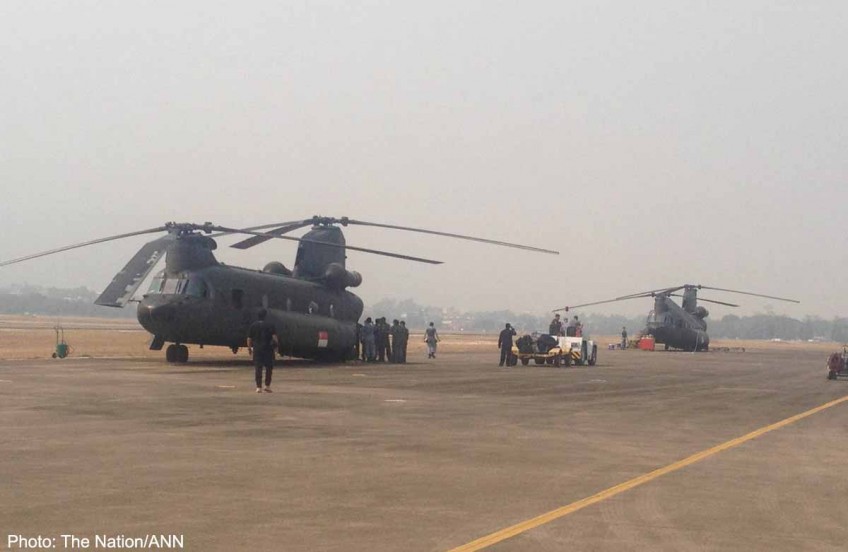S'pore copters help douse forest fires in Thailand

The Thai authorities continued battling forest fires in northern Thailand yesterday as the smog eased slightly in some spots. Still, experts say the haze this year is the worst since 2007 and are uncertain when air pollution will recede to safe levels.
The smog is an annual scourge during the parched January to April period as farmers in Thailand, Laos and Myanmar burn their agricultural waste after harvest. During this time, the number of people with respiratory ailments spikes while planes cannot land because visibility is too low.
"This year is the worst," said Dr Phongtape Wiwatanadate, director of Chiang Mai University's Centre for Air Quality Research and Management, which has been monitoring air quality since 2007.
There are now more days where the air pollution exceeds acceptable standards, as well as higher levels of pollutants in the air, he said.
At 2pm yesterday, eight northern provinces recorded air pollution that exceeded safe levels.
The amount of small particulate matter measuring up to 10 microns in diameter was the highest in the northernmost province of Chiang Rai, where the 24-hour moving average reading was 322 micrograms per cubic m.
Thailand's acceptable standard is 120 mcg per cubic m.
In a bid to stop new fires, the Thai government banned villagers from entering forests in 10 northern provinces until the end of next month, reported the Bangkok Post.
Yesterday, two military helicopters from Singapore helped douse fires near the Doi Inthanon peak in Chiang Mai province, said Thai officials. About 50 Singapore military officers worked together
with their Thai counterparts on the aerial operations, said Lieutenant-General Satit Pittarat, the Thai regional army commander in a press briefing.
The Singapore Armed Forces deployed the Chinook helicopters on Wednesday, together with a 5,000-litre water bucket from the Singapore Civil Defence Force, on request from Thailand.
Meanwhile, police have made at least 16 arrests for illegal burning in the north over the past week.
But Dr Phongtape said dousing fires and arresting people only go so far in solving the problem.
The real issue is the contract farming of corn, which has expanded rapidly in recent years.
This is because farmers torch land to clear it for a new plantation, and also burn the leftover stubble to save on the disposal cost.
"The contracting conglomerates should get involved instead of leaving farmers to deal with the post-harvest waste," he said.
"I don't see any attempt to resolve this sustainably now. Arresting people doesn't help."
tanhy@sph.com.sg

This article was first published on March 20, 2015.
Get a copy of The Straits Times or go to straitstimes.com for more stories.